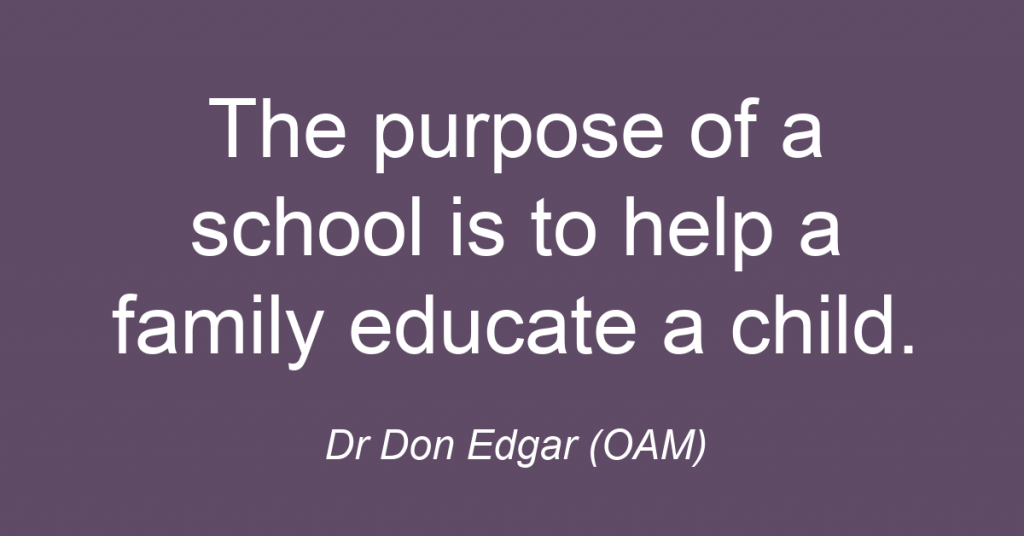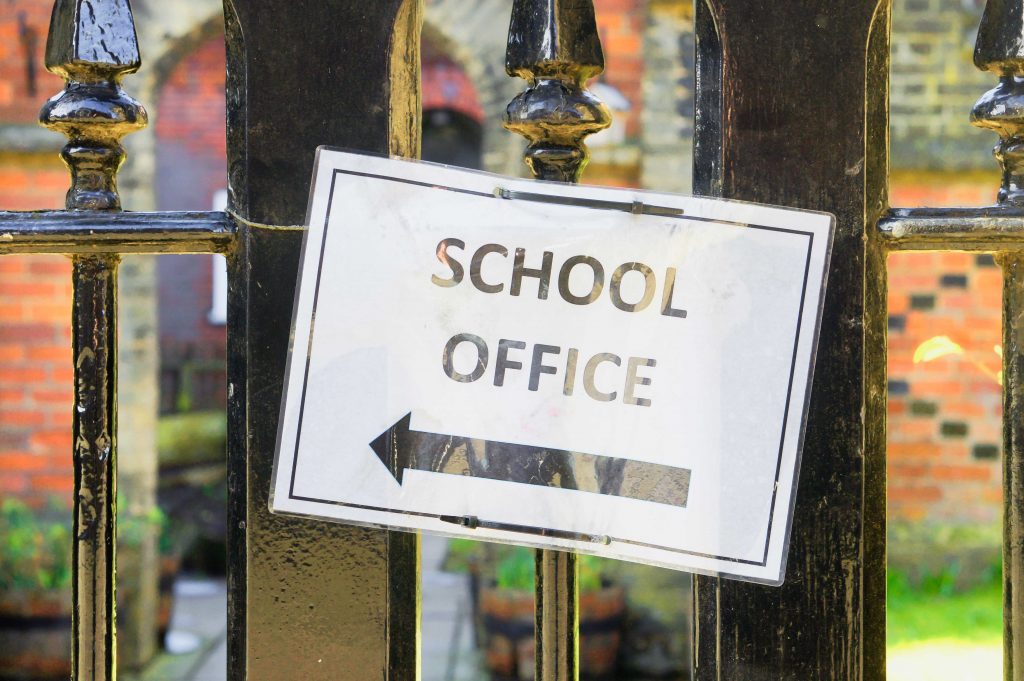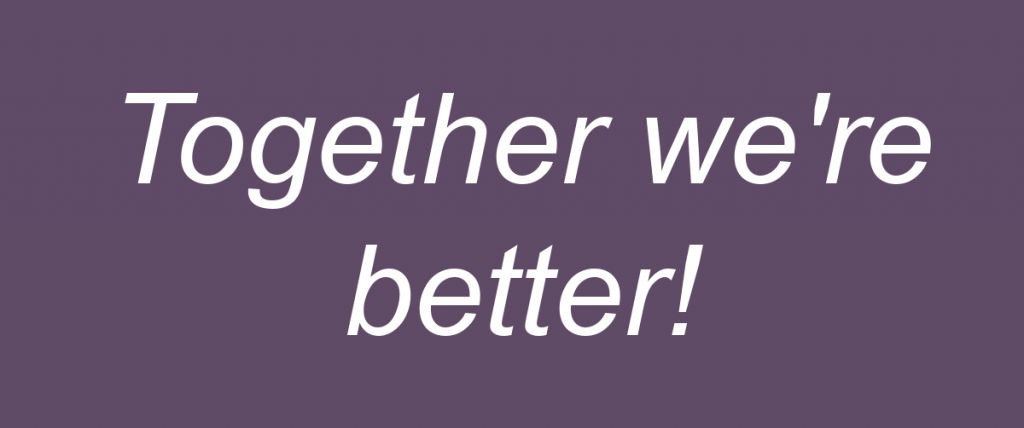A good teacher-parent relationship is essential in the education of our children. Yet, we often compromise this partnership. Why?
School gates are interesting. We enter them as wee beings, full of parental love and hungry for learning. We leave them a decade or more later, excited and ready to take our place in the world. But what do those school gates represent in the interim?
Often large and imposing, those gates can form a barrier between families and schools. They divide the most significant educators in a child’s life; their families and their school teachers.
Dr Don Edgar (OAM) has been one of Australia’s greatest academic contributors to family law and policy. He says, “The purpose of a school is to help a family educate a child.” If that is the case, then the parent-teacher partnership is one of the noblest collaborations possible.
Unfortunately, when kids start school, often we shut the school gates and divide a child’s life into ‘school’ and ‘home’. We assume the majority of the learning happens on the inside of the gates. That’s not true.
What do parents and teachers bring to the partnership?
Parents and teachers hold very different, but equally powerful banks of knowledge. Generally, a parent has the relational knowledge and teachers have expert knowledge.
Parents know the way their child learns best. They recognise what is most likely to cause fear or pain and shut down their child’s learning. They are also intimate with the cultural and familial nuances that will affect both academic and social learning. Most of all they give their child the confidence and support that comes with unconditional love.
Teachers have expert knowledge in education and curriculum. They also have experience with the developmental stages kids travel through. They have literally seen it hundreds of times in hundreds of kids. And they view that development with the wonder of someone who has decided that working with kids and education is how they want to spend their lives. It’s their calling.
If we marry that relational and expert knowledge…our kids will be unstoppable. However, often we don’t. We create a barrier, an ‘us and them’. Sometimes it is unintentional. This division does our kids no favours.
What gets in the way of parents and teachers working together?
What comes between parents and teachers is passion. This is not just any business exchange. This is the business of children. It has emotional investment far beyond any other industry.
Mr Mathew Irving is Principal of Great Southern Grammar in Western Australia. He explains that teachers are often overly sensitive to criticism by parents. It’s understandable. This is their vocation, it’s not just a job, it is part of their identity. So yes, they feel it deeply when they are challenged. It questions their understanding of self.
“Only very recently has education been dragged into the corporate world of transparency and hard accountability. The classroom is no longer the private and sacred domain of the lone teacher. Their results are online for parents, national testing is widely reported, ATAR results are turned into school league tables. Performance is measured, and questions are asked.”
This change has happened quickly, and teachers are sometimes off balance as a result, especially when parents are overly aggressive and demanding. Rather than seeking to build a supportive partnership around the child, there can be a clash between the corporate expectations and the vocation of educating and nurturing kids.
Just as teachers can bring a great deal of emotional baggage to this relationship, so can parents. For a parent, your child is the most important thing in your life. The gloves come off if there is a perceived wrong. Parents approach teachers with an attitude that they would probably not adopt with any other professional.
Often there is the expectation that teachers be on call for parents at all times. It is not unusual for teachers to be cornered for a parent-teacher meeting on the sidelines of a sporting event. Even more common is a parent waiting in the corridor as a teacher walks out of class after 6 consecutive periods of teaching, with up to 150 students. With the advent of digital communication, this expectation to be on call has become more intense. I’ve had a parent complain at 8 am that I had not returned the email they sent me at 10 pm the previous night.
Of course, not all parents are this extreme, nor all teachers unaccustomed to criticism, but they are trends that are becoming far more visible.

What do we jeopardise when we don’t create great partnerships?
At the centre of our partnership is children. They are the biggest losers when we don’t nurture effective relationships.
What do they lose?
1. Kids lose the opportunity for safe relationships with adults who are on the same page and invested in their care. Never underestimate how powerful it is for kids to be receiving the same messages about learning and values at home and at school. Disengagement comes from a child receiving mixed messages.
2. Relationships with teachers and other school staff are a child’s entry point into an adult world. If those relationships are positive, it is a great advantage for a child. It empowers them to face the world with an expectation of collaboration, mentorship and growth.
3. Children don’t have as many significant adults outside of the home as they used to. This is due to the increase in smaller families, separated families, migration and the fact that parenting has become very private. All of this means that teachers have become more significant in providing different versions of what it means to be a happy, successful adult. If a supportive parent-teacher partnership exists, kids can seek clarity and different perspectives from teachers who are invested in their care.
4. Children learn about relationships by seeing relationships. The partnership that parents and teachers have, and the regard and respect they show one another, can have a powerful impact.
5. Ultimately learning is compromised. If the relationship between teacher and student is sullied by undermining at home, the child loses. Respect breeds trust and trust is required for effective learning. It’s important to let your child know you trust their teachers. If you don’t, that’s a conversation you need to have privately with the school.
The Way Forward
Mr Irving says, “The way to navigate our way forward is to show respect – both ways. We are all in this together and we have a shared opportunity to create the synergy that sparks a child’s passion for learning and life.”
He’s right. Both parties are working towards the nurturing and growth of a young person. We have a common bond and interest. It is such a worthy shared venture that we need to fling those imposing school gates wide open and map our way forward together.









